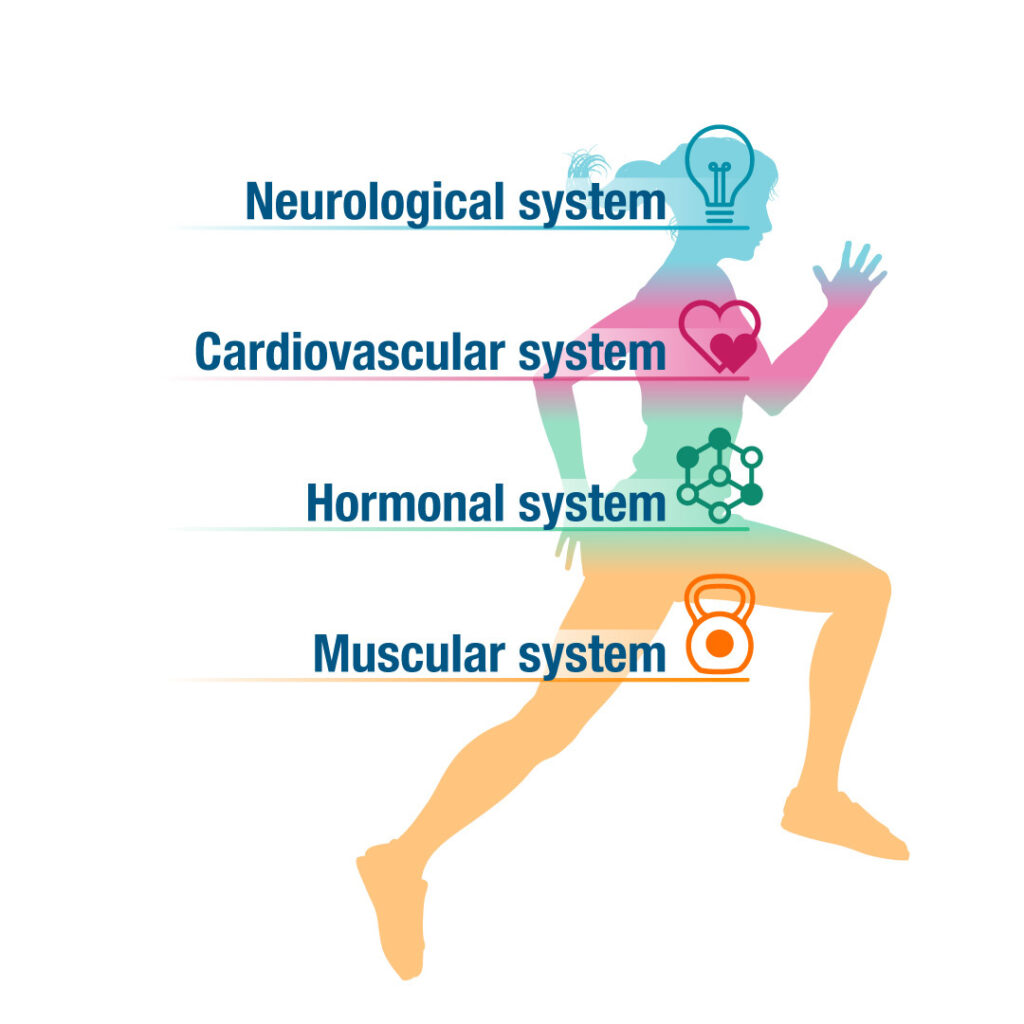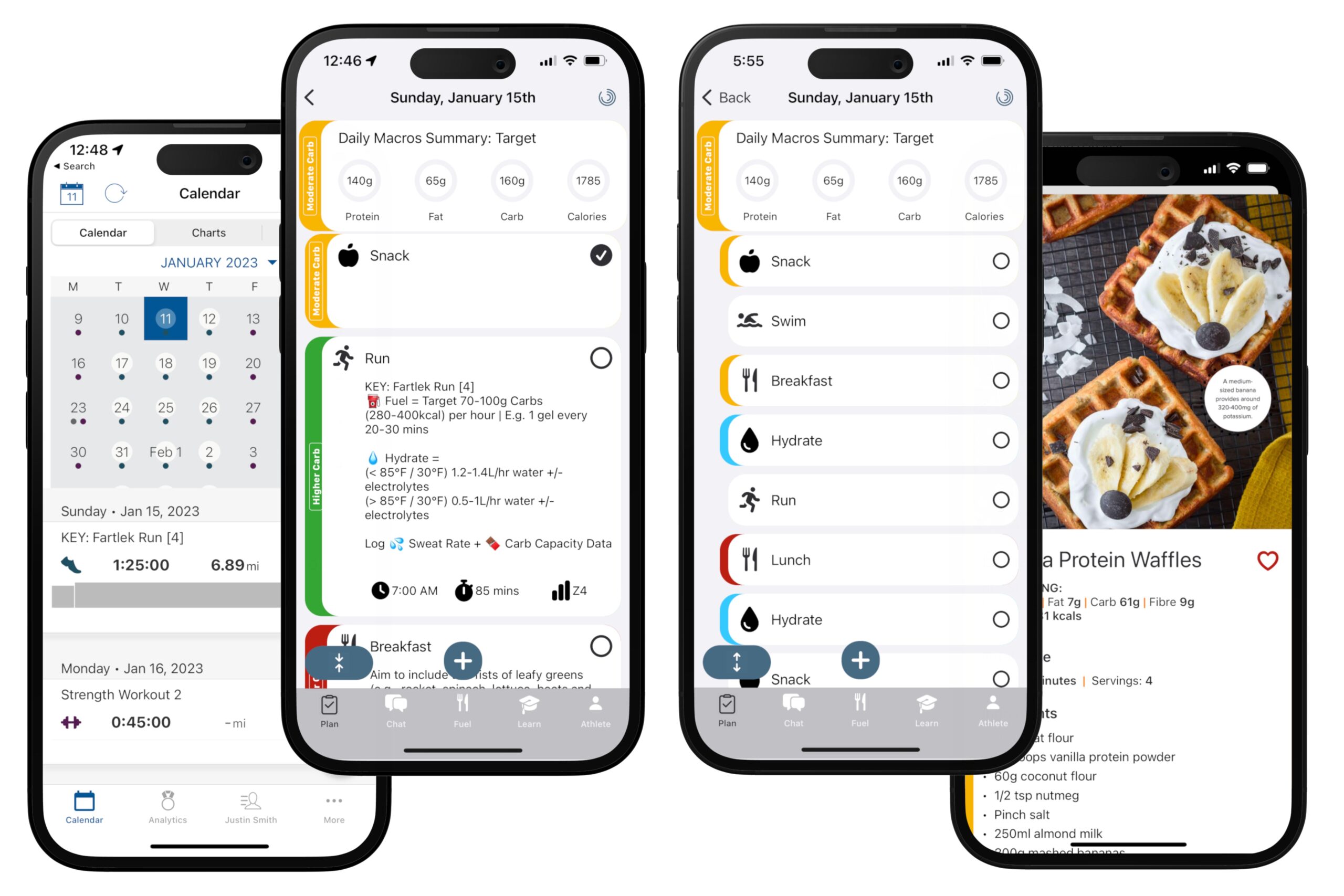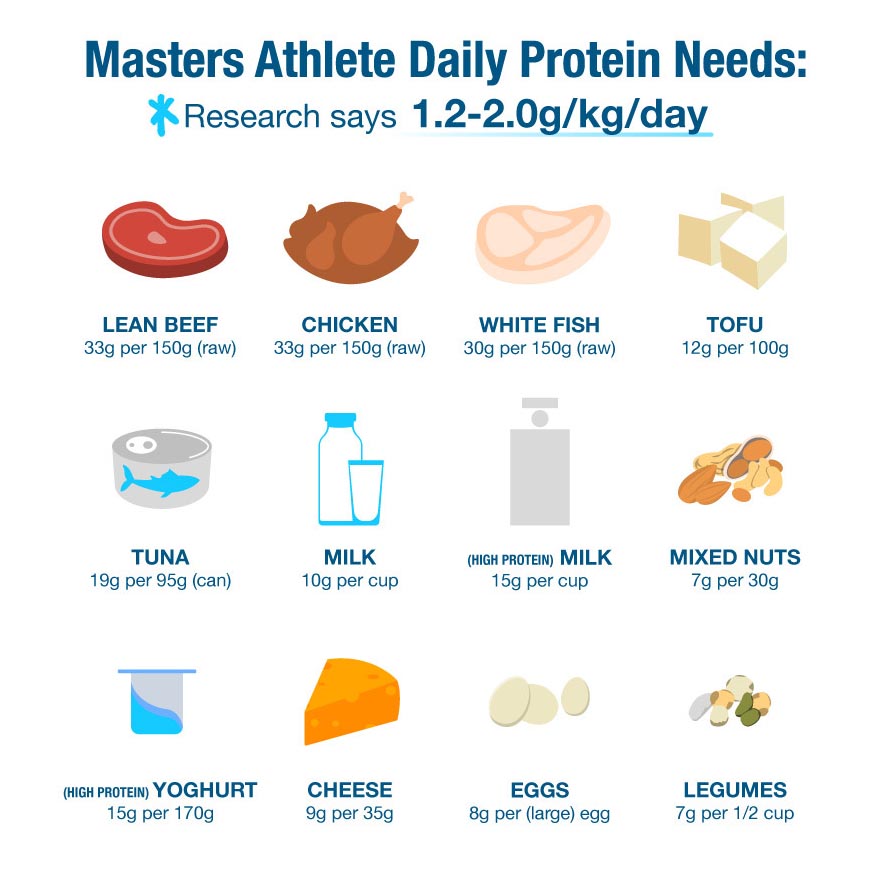Masters athletes are a special breed, and when coaching them, it’s important to understand and address their changing physiological and nutritional needs. While many of us feel young at heart, it’s important to come to terms with the realities of aging. I was a bit horrified to learn that the term’ Masters Athlete’ refers to athletes competing in age groups 35 and above. Yes, you read that correctly, 35 and above!
It can’t be ignored that bodily changes occur at or around 40 years old, including cardiovascular, thermoregulatory, musculoskeletal and neurological changes, which can impact exercise performance. Some physical changes that occur at an older age include reductions in strength, changes to muscle mass, loss of bone density, increased body fat levels and a loss of flexibility. Sleep and cognitive function (i.e., focus, reaction time, memory) may also be impaired. We can’t “fight” aging, and who would want to — it’s awesome! Instead, I want to clarify what’s happening to your masters athletes and how to help them meet their physical and nutritional needs.
There are four areas we are going to address and counterbalance with simple nutrition: your muscular system, cardiovascular system, hormonal system and neurological system. Your body loses muscle as you age thanks to sarcopenia, your heart is at greater risk of cardiovascular disease, your hormone levels shift and your brain requires extra nutritional support for cognitive function. This may sound daunting; however, with the right interventions, athletes can absolutely stay healthy and strong throughout their life.

There are four areas we are going to address and counterbalance with simple nutrition: your muscular system, cardiovascular system, hormonal system and neurological system.
Your body loses muscle as you age thanks to sarcopenia, your heart is at greater risk of cardiovascular disease, your hormone levels shift and your brain requires extra nutritional support for cognitive function. This may sound daunting; however, with the right interventions, athletes can absolutely stay healthy and strong throughout their life.
Offsetting Muscle Loss
The greatest challenge master’s athletes face is sarcopenia, the natural loss of muscle tissue as we age. Typical sarcopenic decline (i.e., loss of skeletal muscle mass) is lost at a rate of ~1% per year and muscle strength (e.g., 1-repetition maximum) at ~3% per year.
Since we know it’s happening, skeletal muscle retention with advancing age is of incredible physiological importance. Athletes typically see a slower progression of sarcopenia than sedentary individuals, but this depends on two main factors: daily protein intake and physical activity (specifically strength training).
Dietary protein has a range of essential effects for athletes, including alleviating exercise-induced muscle soreness and inflammation, stimulating the synthesis and accretion of muscle proteins, potentiating muscle hypertrophy, strength and aerobic performance. When it comes to the optimal source of said dietary protein, there are some nuances and differing opinions.
It is generally considered that proteins that supply a full complement of essential amino acids, particularly leucine, offer the greatest advantage for stimulating muscle protein synthesis. In this regard, animal-derived proteins (i.e., whey, milk, beef) are often reported to promote superior muscle remodeling responses to plant-based proteins. However, consuming a higher dose of plant-based protein or combining various plant-based proteins may provide an amino acid profile sufficient to optimize muscle remodeling.
So how much do athletes really need? The current recommended daily allowance (RDA) is that daily protein intakes should be ~1.2-2.0g/kg/day for most training days; slightly higher on heavy training or strength training days (~50% increase above the current RDA). However, according to one clinical trial, “It is possible that even 1.2 g/kg/d may not be enough to adequately stimulate muscle protein synthesis (MPS) throughout the day since other research showed higher rates of daily MPS when consuming 1.5 g/kg/d, compared with the current RDA.”
This position is partly based on evidence that protein ingestion to stimulate muscle protein synthesis requires greater relative intakes in older individuals. A practical recommendation is consuming ~30g of protein per meal and 10-20g of protein when snacking. Strategic meal planning with high quality and regular protein intake, and using protein powder, dairy foods, nuts, tofu and tempeh, lentils and legumes, seeds and eggs as part of meals or recovery snacks, will help achieve this.
General Nutrition of Masters Athletes
Across the life span, carbohydrate and fat recommendations are generally the same; based on training load, activity level, body composition goals and individualized preferences. Carbohydrate and glycogen functionality is similar in older athletes compared to young athletes. Glycogen uptake, storage, and insulin usage may be affected by medical conditions such as diabetes.
Still, the carbohydrate recommendations for training and performance are generally the same for all athletes. Meeting these targets, however, may need to be managed within a lower energy budget; therefore, careful meal planning is essential. High-quality, high-fiber carbohydrates are optimal for digestive health and weight management. Including oats, legumes, whole wheat pasta, brown rice, grain breads, and plentiful fruits and vegetables will assist with meeting these needs.
Older athletes will utilize fat similar to younger athletes. Focusing on healthier fats (unsaturated and omega-3) is always recommended for improved cardiovascular health. Using more fatty fish, like salmon, tuna and mackerel, cooking with olive and avocado oils, and incorporating avocado, nuts and seeds is important for athletes of any age. Recovery nutrition is the same for all athletes.
The dietary strategies for replacing muscle glycogen, repairing muscle, revitalizing immune health and rehydration should be followed to facilitate optimal recovery. FUELIN simplifies this process by adjusting the plan weekly based on your training and personalized goals, making it very clear what to eat before, during and after workouts.

Two Key Supplements to Consider
What about supplements? Masters athletes may take supplements for both health and performance reasons, although it’s important to note that less research has been conducted on the sports performance benefits of supplements in older athletes.
Creatine monohydrate is a popular dietary supplement among athletes due to its ergogenic ability to enhance the benefits of resistance exercise and optimize performance. Creatine monohydrate supplementation can improve high-intensity exercise capacity by 10% to 20% through increasing skeletal muscle stores of phosphocreatine (PCr). With an increase in the stores of skeletal muscle PCr, individuals can achieve higher workloads during repetitive high-intensity exercise, often increasing muscle mass and strength.
Elevated and sustained low-grade inflammation during the aging process (i.e., inflamm-aging) has a negative effect on aging muscle and bone. Creatine has been shown to act as an antioxidant and, as such, may reduce inflammation in aging adults. Lastly, studies have shown that creatine helps protect our brains from the natural degradation of aging, i.e., cognitive processing, brain function, memory, and even recovery from trauma like bike crashes. The current recommendation is 3-5g/d.
Next on the list of beneficial supplements for aging athletes are omega-3s. We have seen athletes consume long-chain omega-3 polyunsaturated fatty acids (n-3 PUFAs) supplements to potentially reduce inflammation, improve recovery (following injury), enhance immunity and, in some cases, increase skeletal muscle metabolic efficiency. Incorporating n-3 PUFAs into the skeletal muscle membrane may improve the transport of nutrients, such as amino acids, into muscle, increasing muscle protein synthesis rates. In healthy older people, prolonged supplementation with n-3 PUFAs has been shown to increase rates of MPS and, therefore, may help preserve or facilitate increases in muscle mass with age.
Interestingly, omega-3 supplementation has been shown to improve measures of muscle strength in older women but not always in older men, highlighting the emerging evidence that men and women may have different needs and responses to supplementation. Given the current evidence, it is recommended that older adults aim to consume 3 to 5 g/d of n-3 PUFA to benefit skeletal muscle metabolism, lower inflammation and enhance cardiovascular capacity.
Key Takeaway:
The “Core Four” you want to remember: PCOD – protein, creatine, omega-3 and vitamin D.
Honorable mention shout-outs to curcumin, calcium and B vitamins.
Micronutrient Deficiencies in Masters Athletes
Lastly, addressing any vitamin and mineral deficiencies that may arise in aging athletes is important. Micronutrients that are important in aging include calcium and vitamin D for bone health, vitamin B-12, potassium, plus the antioxidant vitamins C & E. Micronutrient deficiencies in older athletes are possible due to changes in requirements, reduction in the ability to metabolize and absorb them, or injuries accompanied by increased medication use.
Regularly eating nutrient-rich, colorful foods will increase the likelihood of maximizing micronutrient intake, which in turn helps avoid any deficiencies and reduce inflammation. Fuelin always recommends biannual blood testing to assess possible deficiencies before supplementing.
IMPORTANT ‘OTHER’ CONSIDERATIONS:
Hydration
Age-related changes such as a decreased perception of thirst, reduced kidney function, changes in hormones, and changes in sweat response may mean decreased voluntary fluid intake during exercise and/or increased requirements. Measurements of fluid need through pre– and post–training and competition weights are recommended to help determine fluid requirements for individual athletes. Fuelin incorporates sweat testing and recommends that all athletes do this regularly before a competition.
Existing Medical Conditions
Masters athletes may be more likely than younger athletes to present with medical conditions managed with one or more medications. These include cardiovascular disorders, diabetes, osteoarthritis, asthma, musculoskeletal injuries, anxiety and depression.
Medications can impact the athlete through associated side effects. Athletes using medications must be aware of potential side effects and impacts on their safety while training and competing, as well as their performance. For example, beta-blockers are a commonly used medication for high blood pressure, with the side effect of lowering heart rate. This effect of lowering heart rate can also mask hypoglycemia.

Suggestions on how to meet your daily needs:
Breakfast: ~40g Protein
Overnight Oats – oats + hemp seeds + fresh fruit + nut butter + 1.5 scoops whey protein powder. *Milk or water added – possibly more protein, depending on the type of milk.
Lunch: ~40g
1 can tuna + 2 cups arugula + ½ diced cucumber + 2 tbsp dressing
meatless option: ½ cup edamame + 1 cup quinoa + 2 cups arugula + ½ diced cucumber + 2 tbsp hemp seeds + 2 tbsp dressing
Snack(s): ~20-30g
(~28g) 1 cup cottage cheese + 1 slice toast + 1/3 avocado + sliced tomatoes + Everything But The Bagel Seasoning
(~26g)1.5 cup Greek yogurt + 2 tbsp chia seeds + handful walnuts + ½ cup blueberries.
Dinner: ~40g
6-7oz chicken/fish/beef + roasted veggies + roasted sweet potato
meatless: ½ block extra firm tofu + ½ cup black beans + ½ cup cooked amaranth + 2 tbsp hemp seeds
Summary
Just as you would make specific modifications to a masters athlete’s training plan, the same unique considerations must be made for their sports nutrition. At what point in your life does nutrition really matter? Is it those crucial first few years of life, or maybe adolescence and what about older athletes? The simple answer is that it always matters! However, as athletes age, their needs become more specialized, requiring proper care and focus. Adjustments to nutrition and hydration can and should be made to assist with beneficial training and racing adaptations.
References
Abdelmagid S.M. et al. (2015, February 15). Role of inflammation in the aging bones. Retrieved from https://pubmed.ncbi.nlm.nih.gov/25510309/
Da Boit, M. et al. (2016, November 16). Sex differences in the effect of fish-oil supplementation on the adaptive response to resistance exercise training in older people: a randomized controlled trial. Retrieved from https://pubmed.ncbi.nlm.nih.gov/27852617/
Hu, Y. et al. (2019, September 30). Marine Omega-3 Supplementation and Cardiovascular Disease: An Updated Meta-Analysis of 13 Randomized Controlled Trials Involving 127 477 Participants. Retrieved from https://pubmed.ncbi.nlm.nih.gov/31567003/
Janssen, I. et al. (2002, May). Low relative skeletal muscle mass (sarcopenia) in older persons is associated with functional impairment and physical disability. Retrieved from https://pubmed.ncbi.nlm.nih.gov/12028177/
Jensen, G.L. (2008, November-December). Inflammation: Roles in aging and sarcopenia. Retrieved from https://pubmed.ncbi.nlm.nih.gov/18974248/
Kim, I.Y. et al. (2014, October 28). Quantity of dietary protein intake, but not pattern of intake, affects net protein balance primarily through differences in protein synthesis in older adults. Retrieved from https://pubmed.ncbi.nlm.nih.gov/25352437/
Kreider, R.B. (2003, February). Effects of creatine supplementation on performance and training adaptations. Retrieved from https://pubmed.ncbi.nlm.nih.gov/12701815/
Lawler J.M. et al. (2002, January 11). Direct antioxidant properties of creatine. Retrieved from https://pubmed.ncbi.nlm.nih.gov/11779131/
Oikawa, S.Y. et al. (2021, July 20). Eat like an athlete: insights of sports nutrition science to support active aging in healthy older adults. Retrieved from https://pubmed.ncbi.nlm.nih.gov/34283389/
Philpott, J.D. et al. (2018, November 28). Applications of omega-3 polyunsaturated fatty acid supplementation for sport performance. Retrieved from https://www.tandfonline.com/doi/abs/10.1080/15438627.2018.1550401?journalCode=gspm20
Reid, K.F. et al. (2014, January). Longitudinal decline of lower extremity muscle power in healthy and mobility-limited older adults: influence of muscle mass, strength, composition, neuromuscular activation and single fiber contractile properties. Retrieved from https://pubmed.ncbi.nlm.nih.gov/24122149/
Roschel, H. et al. (2021, February 10). Creatine Supplementation and Brain Health. Retrieved from https://pubmed.ncbi.nlm.nih.gov/33578876/
Smith, G.I. et al. (2015, May 20). Fish oil-derived n-3 PUFA therapy increases muscle mass and function in healthy older adults. Retrieved from https://pubmed.ncbi.nlm.nih.gov/25994567/
Tarnopolsky, M.A. (2008, November). Nutritional consideration in the aging athlete. Retrieved from https://pubmed.ncbi.nlm.nih.gov/19001886/









